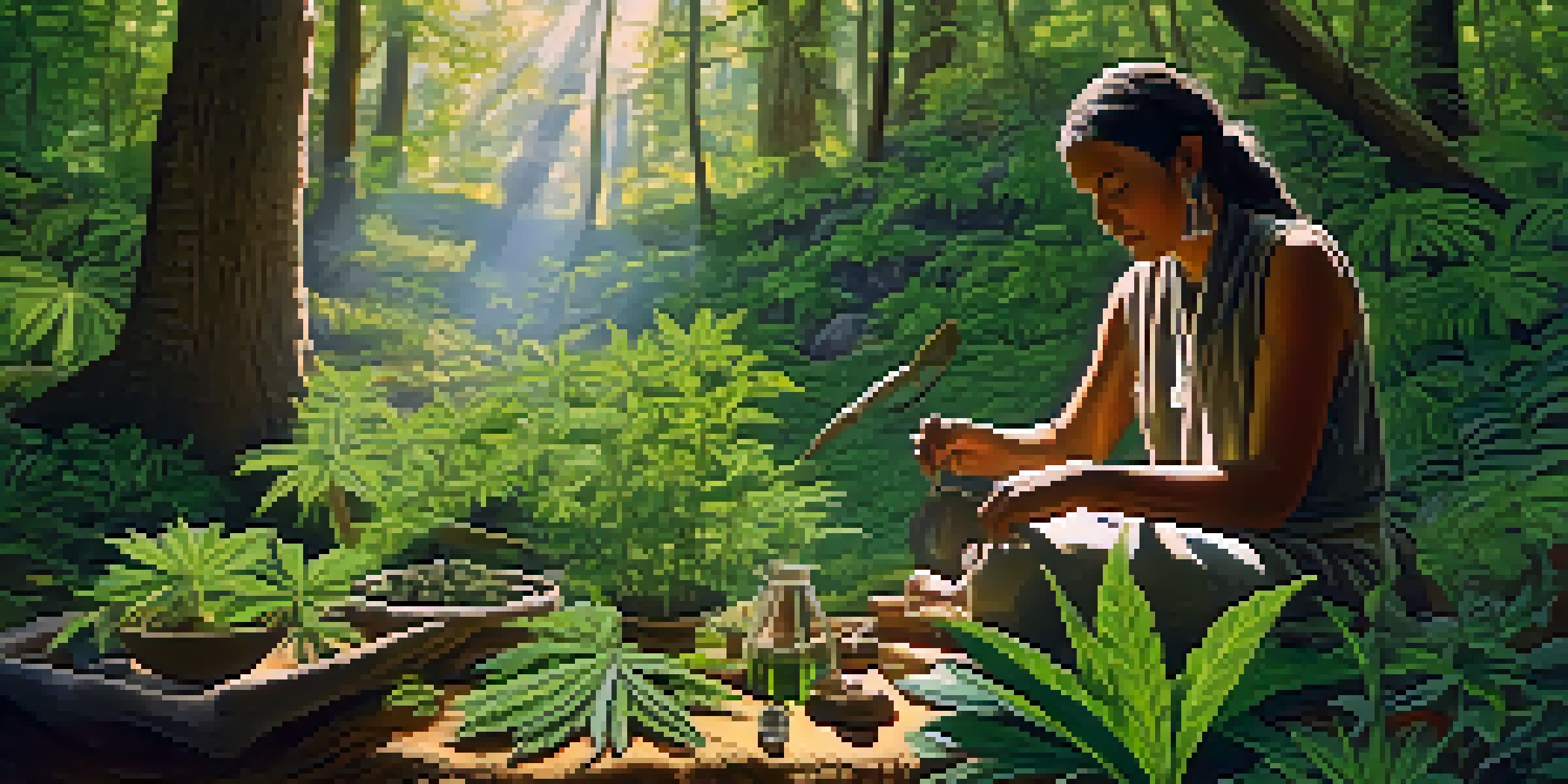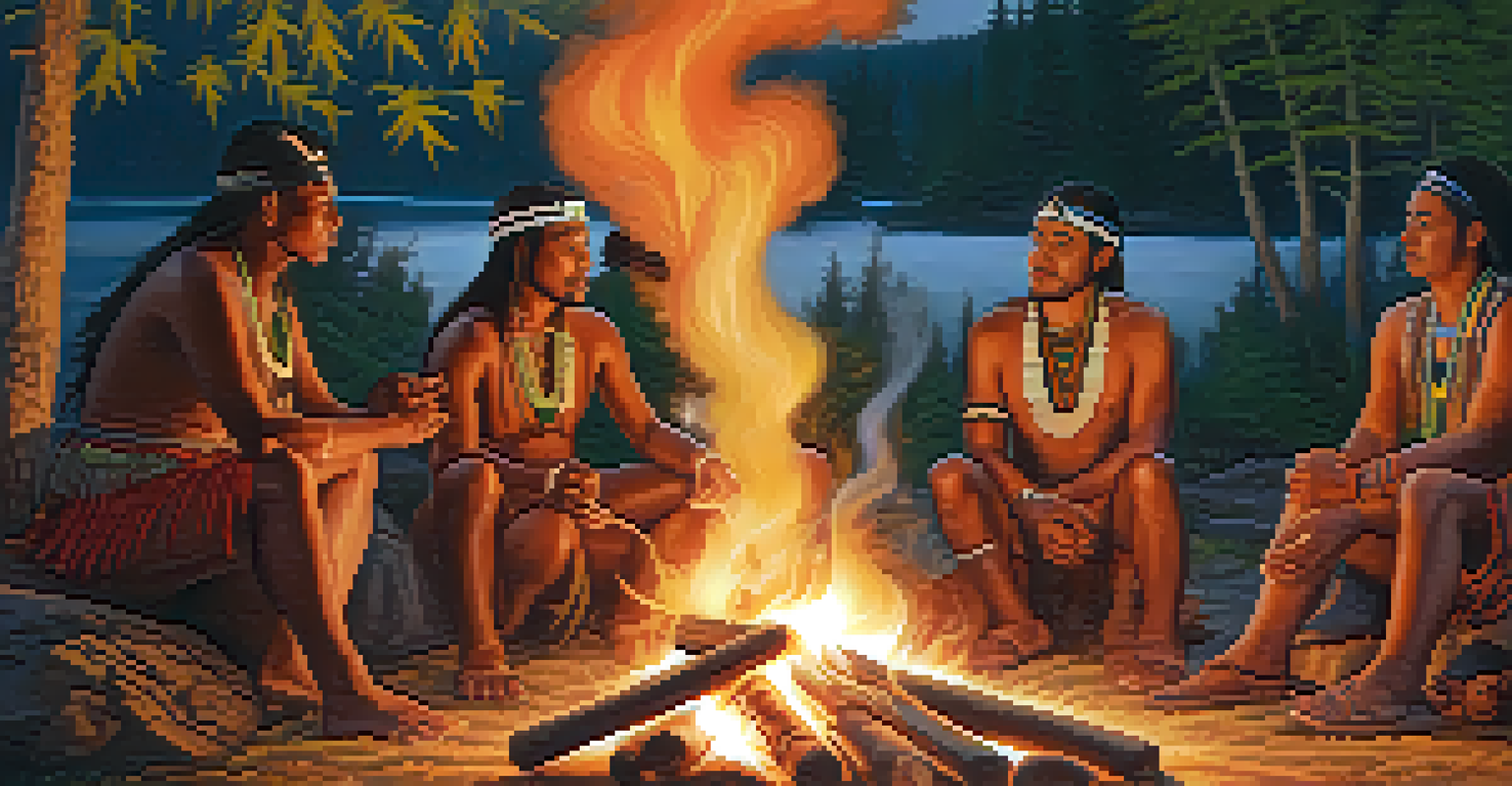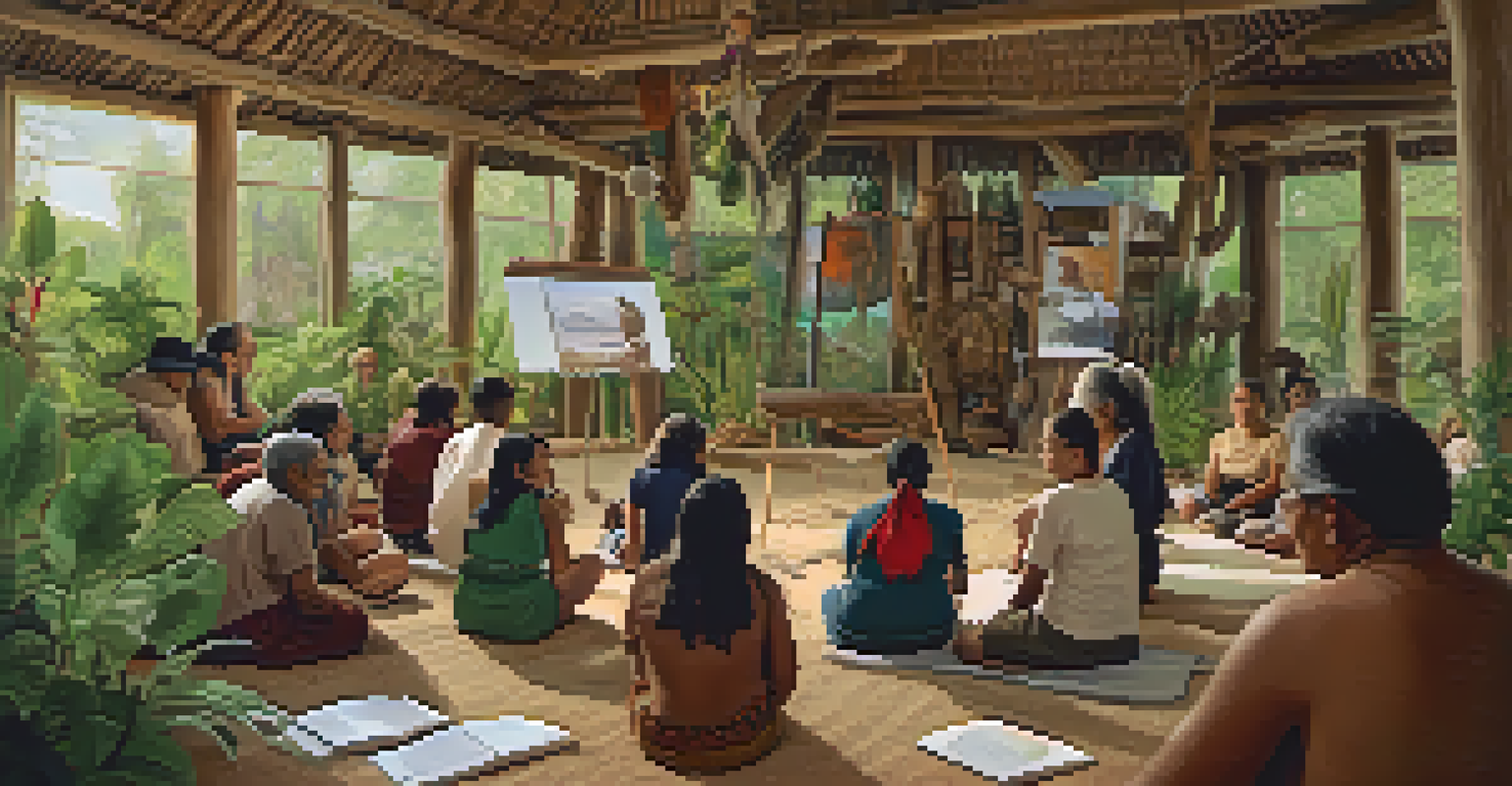Indigenous Cultures and Their Use of Marijuana for Healing

The Historical Context of Indigenous Healing Practices
Indigenous cultures around the world have rich histories of using natural resources for healing. Long before modern medicine, these communities turned to the land for remedies, relying on plants that offered both physical and spiritual benefits. Marijuana, known for its therapeutic properties, has been part of these traditional practices for centuries.
Indigenous healing practices are a reflection of our relationship with the land and the respect we have for the natural world.
These healing practices are often intertwined with cultural beliefs and rituals, providing a holistic approach to health. Indigenous healers, or shamans, would incorporate marijuana into their ceremonies, believing it could enhance spiritual connections and promote emotional well-being. This deep-rooted history sets the stage for understanding the contemporary use of marijuana in Indigenous healing.
As we explore these practices, it's essential to recognize the respect and reverence Indigenous peoples have for nature. Their knowledge is not just about the plant itself, but also about the ecosystems surrounding it, highlighting a profound relationship with the earth that modern society often overlooks.
Marijuana as a Medicinal Plant in Indigenous Traditions
For many Indigenous cultures, marijuana is more than just a plant; it's a powerful medicine. Used to alleviate various ailments, from chronic pain to anxiety, its application in healing rituals speaks volumes about its significance. Indigenous healers often tailor their use of marijuana based on individual needs, emphasizing a personalized approach to treatment.

In some cultures, marijuana is combined with other herbs and natural substances to create potent remedies. This practice reflects the Indigenous understanding of synergy in nature, where different elements work together to enhance healing. Such combinations are not random; they are rooted in traditions passed down through generations, showcasing the depth of knowledge within these communities.
Indigenous Healing and Nature's Role
Indigenous cultures have long utilized natural resources, such as marijuana, for holistic healing that intertwines physical, mental, and spiritual health.
Moreover, the use of marijuana in traditional healing signifies a broader philosophy of wellness that includes mental, emotional, and spiritual health. This holistic view contrasts sharply with conventional medicine, which often focuses solely on physical symptoms. By embracing this multifaceted approach, Indigenous cultures are paving the way for a more inclusive understanding of health.
Cultural Significance of Marijuana in Rituals and Ceremonies
Marijuana plays a vital role in various rituals and ceremonies among Indigenous peoples, often symbolizing purification and connection to the spirit world. For instance, it may be smoked or consumed during sacred ceremonies to enhance meditation and spiritual experiences. This practice not only facilitates individual healing but also fosters communal bonds among participants.
Education is the most powerful weapon which you can use to change the world.
These rituals often emphasize gratitude and respect for nature, reflecting a belief that the earth provides for those who honor it. By incorporating marijuana, participants engage in a profound dialogue with the natural world, acknowledging the plant’s role in their lives. This cultural significance transforms marijuana from a mere substance into a sacred element of their identity.
As Indigenous cultures continue to navigate the challenges of modern society, these rituals and ceremonies serve as reminders of their heritage. They reinforce the importance of maintaining traditional practices while adapting to contemporary realities, ensuring that the spiritual and medicinal use of marijuana remains relevant today.
Modern Perspectives on Indigenous Marijuana Use
In recent years, there's been a resurgence of interest in traditional Indigenous practices, particularly concerning marijuana. As society becomes more aware of the plant's medicinal benefits, many Indigenous communities are reclaiming their knowledge and practices surrounding it. This renewed focus is not just about healing but also about cultural preservation and sovereignty.
However, the modern legalization of marijuana presents both opportunities and challenges for Indigenous peoples. While it provides a platform for sharing their traditions, it also raises questions about ownership and rights over the plant. Many Indigenous leaders advocate for fair representation and the protection of their knowledge in the evolving landscape of cannabis legislation.
Cultural Significance of Marijuana
Marijuana serves as a sacred element in Indigenous rituals, symbolizing purification and fostering communal bonds through spiritual practices.
Ultimately, bridging traditional practices with modern perspectives can lead to a more inclusive dialogue about marijuana. It encourages society to recognize and respect Indigenous contributions to this field while fostering collaboration that honors their heritage.
Challenges Faced by Indigenous Cultures Today
Despite the rich history and cultural significance of marijuana in Indigenous healing, many communities face significant challenges today. Issues such as land rights, legal barriers, and societal stigma can hinder their ability to practice traditional healing. These challenges not only affect individual health but also threaten the preservation of cultural heritage.
Additionally, the commercialization of marijuana often overlooks Indigenous knowledge, leading to appropriation without acknowledgment. Many Indigenous groups are concerned that their traditional practices may be exploited for profit, diminishing their cultural significance. This situation highlights the importance of advocating for Indigenous rights and recognizing their contributions to the cannabis conversation.
Addressing these challenges requires a collective effort to support Indigenous voices and practices. By promoting awareness and understanding, we can help ensure that Indigenous cultures continue to thrive and that their healing traditions are respected and celebrated.
The Role of Education in Promoting Indigenous Practices
Education plays a crucial role in bridging the gap between Indigenous practices and mainstream society. By incorporating Indigenous knowledge into educational curricula, we can foster a greater understanding of their healing traditions and the significance of marijuana within them. This approach not only benefits Indigenous communities but also enriches the overall narrative around cannabis.
Workshops, community programs, and cultural exchanges can provide opportunities for sharing knowledge and experiences. Such initiatives create spaces for dialogue, allowing individuals to learn from Indigenous perspectives and appreciate the depth of their practices. This mutual respect is vital for promoting healing and cultural preservation.
Modern Challenges and Opportunities
While modern legalization of marijuana presents opportunities for cultural preservation, it also raises concerns about appropriation and the rights of Indigenous peoples.
Moreover, as more people become educated about the historical and cultural context of marijuana, it can help combat stereotypes and misconceptions. Education empowers individuals to advocate for Indigenous rights and support the recognition of their traditional healing methods in modern wellness practices.
Future Directions for Indigenous Healing Practices
Looking ahead, the future of Indigenous healing practices, particularly those involving marijuana, is filled with potential. As societal attitudes toward cannabis continue to evolve, there’s an opportunity for Indigenous communities to reclaim their traditions and integrate them into broader health discussions. This could lead to a revival of traditional knowledge that benefits both Indigenous and non-Indigenous peoples alike.
Collaboration between Indigenous healers and modern healthcare practitioners can also pave the way for innovative approaches to health and wellness. By respecting and valuing Indigenous knowledge, healthcare systems can provide more holistic care options that acknowledge the importance of culture in healing. This partnership has the potential to create more inclusive health environments.

Ultimately, the future of Indigenous healing lies in the hands of the communities themselves. By embracing their heritage, advocating for their rights, and educating others, Indigenous peoples can ensure that their healing traditions, including the use of marijuana, continue to flourish for generations to come.